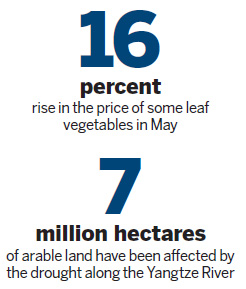Economy
Drought fuels food price increases
By Wu Yiyao (China Daily)
Updated: 2011-05-31 09:41
 |
Large Medium Small |
SHANGHAI - The impacts of China's worst drought in 50 years have been served up on the nation's dining tables as the price of rice and vegetables from drought-hit provinces have skyrocketed.
The average price of staple foods in 50 cities has increased significantly, and the price of some leaf vegetables has jumped 16 percent in one month, according to data from the National Bureau of Statistics.
Decreased production because of the drought has been cited as the major reason for price increases, and the prices of rice and vegetables may not drop soon, according to a report by the Ministry of Agriculture.
Statistics from the Office of State Flood Control and Drought Relief Headquarters show that an area of nearly 7 million hectares of arable land has been affected by the drought, with Hubei, Hunan, Jiangxi, Anhui and Jiangsu provinces most seriously affected.
| ||||
"Cabbage used to be as cheap as paper, and for 5 yuan (77 cents) you would get too many cabbages to carry home," she said.
She has had to switch to melons and pumpkins, which are getting cheaper this year.
She also changed from eating porridge for breakfast to noodles.
"My grandson said he doesn't like the dishes I cook these days, but what else can I do?" she said.

Shoppers at a supermarket in Shanghai's Huangpu district complained that the price of rice produced in Hubei increased 20 percent in one month to 2.6 yuan a kg. Lotus root produced in Hunan also climbed 20 percent during the same period to 4.2 yuan a kg.
In Wuhan, capital of drought-hit Hubei, the average price of 20 monitored vegetables climbed 7.3 percent in one month. The price of cabbage almost doubled in May to 2.22 yuan a kg, according to the Ministry of Agriculture.
The price of freshwater fish, crab and shrimp also witnessed a surge in the past week. Freshwater fish production in several provinces has reached bottom as lakes and rivers are drying up.
If food prices continue to soar during the summer, the increase may exceed 20 percent, which will push up inflation in the short term, Liu Ligang, an economist for the Greater China area with the ANZ Bank, said in his column for Financial Times.
On another note, Gao Wenqi, a researcher with the Shanghai Agricultural Technology Extension and Service Center, said the drought has provided better conditions for aphids to reproduce.
Aphids can produce a new generation in days with no rain, said Gao.
| 分享按鈕 |



